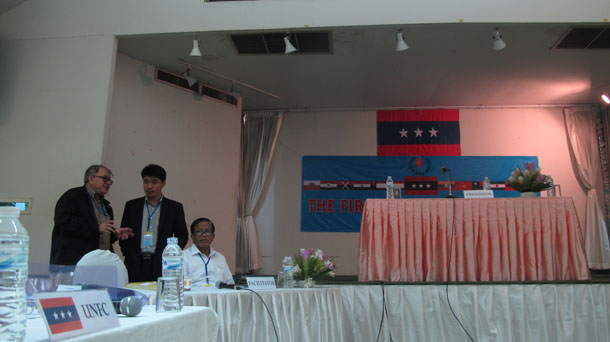CHIANG MAI, Thailand — A threat by the Karen National Union (KNU) to withdraw from a major ethnic alliance has raised concerns that the Karen rebels will move ahead to sign a nationwide ceasefire accord with the government before other armed groups are ready.
On Monday morning, a faction of the KNU led by its chairman, Saw Mutu Say Poe, announced that the KNU would temporarily suspend its membership in the United Nationalities Federal Council (UNFC), an alliance of 12 ethnic groups. Another faction led by the KNU’s deputy chairman, Naw Zipporah Sein, quickly followed up with its own announcement, saying it had no desire to follow suit. Now both sides are talking to see if they can reach an agreement.
The rift came as a shock to other ethnic groups in the UNFC, who have expressed concerns that their own negotiations with Burma’s government may be affected by the recent developments.
Inside sources in the UNFC speculate that the KNU chairman and his followers might try to sign the nationwide ceasefire accord, perhaps as early as this month. The sources, requesting anonymity, said they believed the KNU chairman wanted to withdraw from the UNFC because other UNFC member groups were not yet ready to sign. Even the KNU’s deputy chairman and her followers are not yet ready to sign, KNU sources say.
KNU general-secretary Kwe Htoo Win explained the chairman’s reasons for leaving the UNFC. “Some of their policies and decisions don’t match with our policy. Our circumstances are different, even though we have a common interest,” he said. He added that the chair group of the UNFC, the Kachin Independence Organization, tended to dominate the alliance.
A well-informed KNU source—who asked for anonymity because he was not authorized to speak to the media—said it was clear that the strategies of the KNU and its armed wing, the Karen National Liberation Army (KNLA), were heading in different directions. He speculated that disagreements could even lead to a coup by the KNLA.
Gen. Baw Kyaw Heh, deputy commander-in-chief of the KNLA, wants to move cautiously with the peace process. “It is too early to sign the nationwide ceasefire agreement,” he said, adding that he worried that some KNU leaders would do so quickly and without proper consultation.
UNFC leaders are also requesting more time. “It is not that we don’t want to sign the nationwide ceasefire agreement,” Nai Hong Sar, general-secretary of the UNFC, told The Irrawaddy. “We want to sign it, for sure. But we want to sign it later, after we reach a political settlement.”
Before suspending the KNU’s membership, Mutu Say Poe called for greater freedom to act apart from the UNFC. In a proposal submitted during the ongoing UNFC congress in Chiang Mai, Thailand, he said the KNU should have the authority to make decisions about its own affairs. “The destiny of the Karen will be created by the Karen,” the proposal said.
The proposal also criticized a constitution that is being written by the UNFC as unrepresentative of all members, drawing comparisons with the undemocratic 2008 Constitution by the Burmese government. It also accused the UNFC of creating too much bureaucratic red tape.
Some UNFC members predict that the KNU will not be the only ethnic group to sign the nationwide ceasefire agreement alone. They believe other groups that do not belong to the UNFC, including the Restoration Council of Shan State (RCSS) and the United Wa State Army (UWSA), will likely also sign the agreement individually.
They predict that if the government can secure signatures from these three groups, which each have strong militaries, while opening the door for other ethnic groups to sign later, it might be enough to please the international community without actually appeasing all ethnic groups.
















